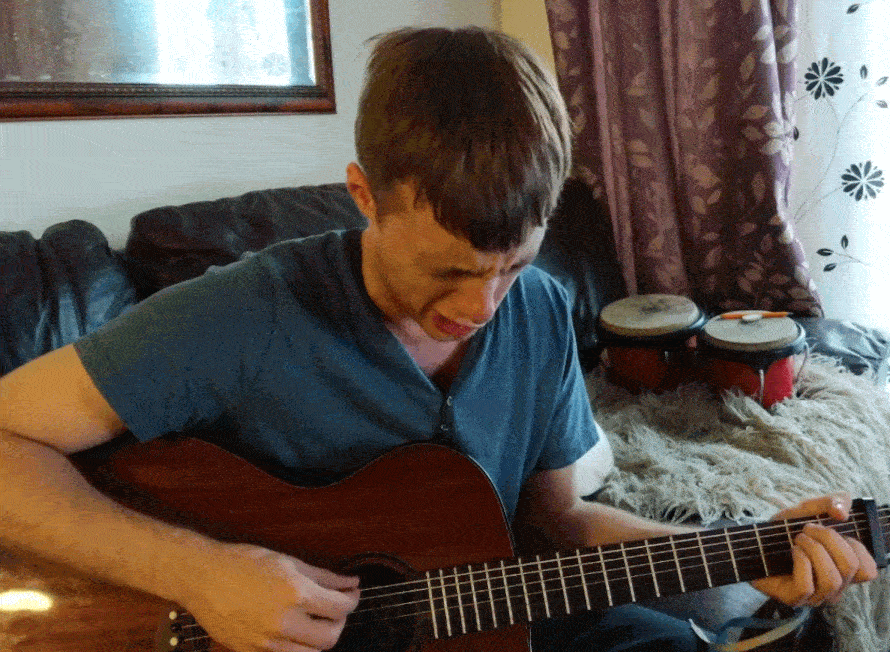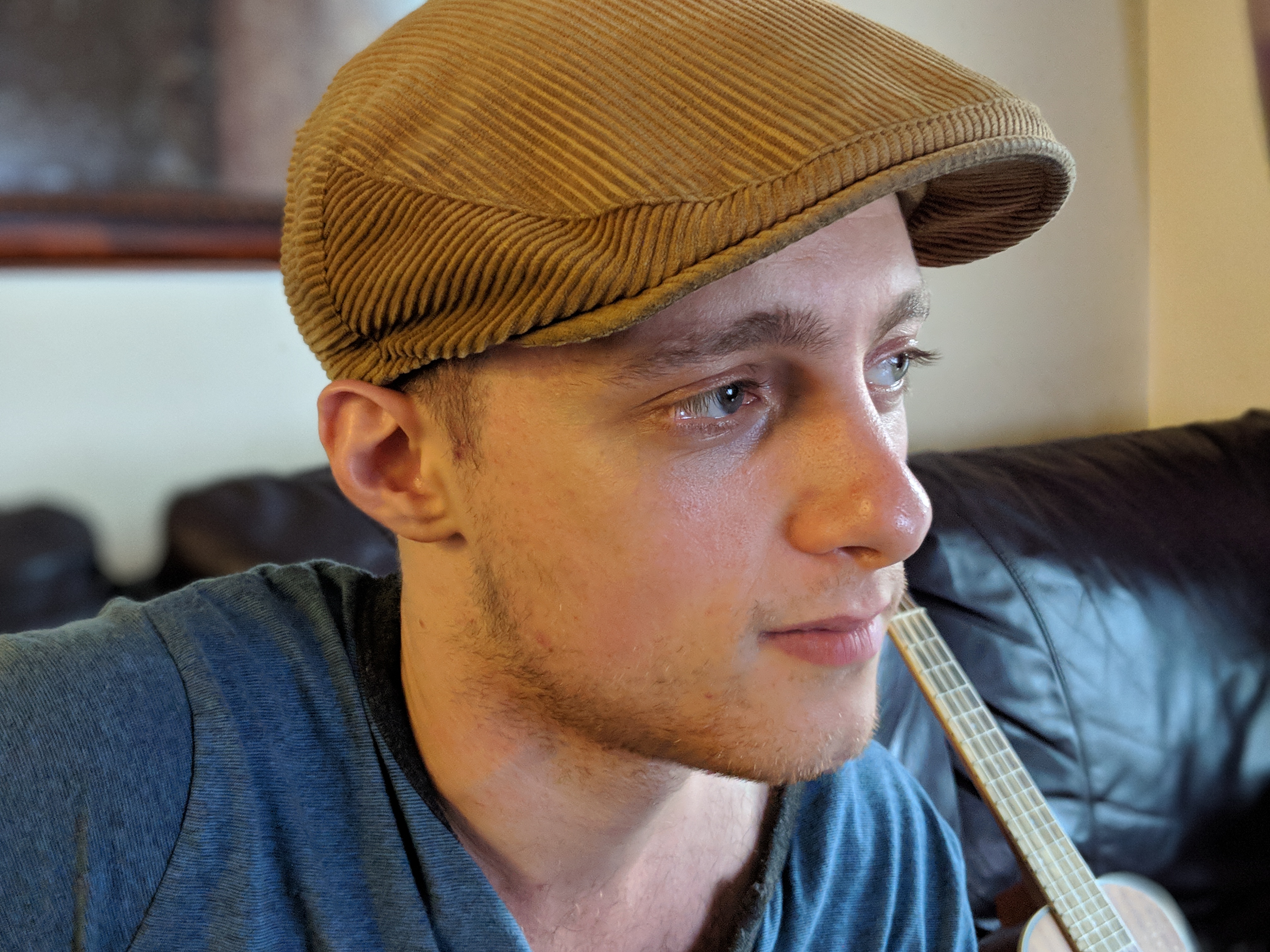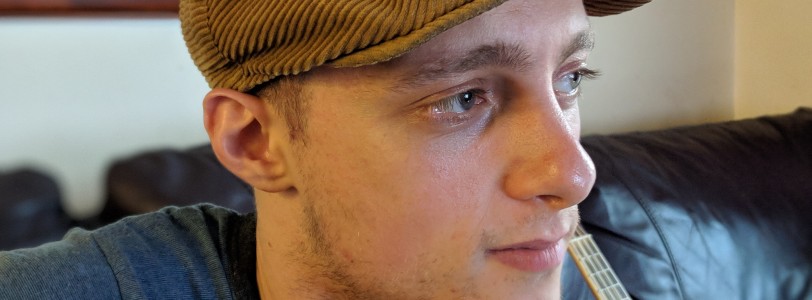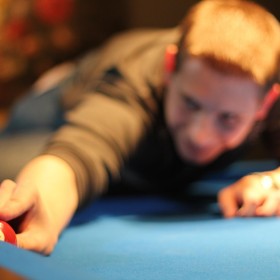I’m slightly apprehensive as I wait outside for Dan to meet me. I’ve known him since we were 13 years old, having gone to the same high school. Our relationship was always cordial, although I know I was never as kind to him as I could have been. We fell out of contact at 16 after finishing our GCSEs, and it was only due to a chance encounter at a house party that we started talking again. It transpires that our lives went down wildly different paths, starting from the very day we finished our last exam in 2010. While I went home and debated which notes to keep or burn, Dan was kicked out onto the streets.
When we meet it’s like old friends, Dan in black jeans, a patched corduroy and wax jacket, and flat cap. We walk the short distance to his ground floor council flat, autumnal leaves underfoot as Dan explains that the council have been lackadaisical on the upkeep of the grounds. The building was once adorned with great creeping vines, but they’ve all died and leave the wood-cladded building exposed. The door to the building is broken.
His front room is littered with instruments; multiple guitars, a mandolin, a ukulele and bongos. While footering about on the guitar we talk about his love for cooking. I’m left to set up and get comfortable as Dan cooks himself some lunch, today it was double cream mushrooms. Having been preparing all his own meals since he was 16, Dan has developed a passion for cooking, making up recipes to incorporate fresh ingredients where possible, and has recently got a job as a chef de partie at a local restaurant.
Meal consumed, we elect to record in the bedroom to dampen the sound of his washing machine.
Finally settled, we begin.
At school, Dan was, by his own admission, ‘a little bit different’. “I had friends, but… I was struggling with some form of autism and ADHD at the time, and a little bit extroverted, but introverted in certain ways.” Nonetheless, he has quite a few fond memories of high school and that was in part due to a very strong music department.
From a young age, Dan had loved performing. He regaled in memories of performing the eponymous character in Joseph and his Amazing Technicolour Dreamcoat at primary school. Arriving in upper school, he quickly made himself familiar with the music department. He had nothing but praise for the staff, and fondly remembers one in particular who encouraged him to progress his music aspirations further. Just how important music is to Dan’s personality becomes clear as we continue talking.
“No real one sole party to blame for it."
The end of your GCSEs are often a time for celebration, reflection, and contemplation about the future. In 2010, you were still able to leave education at 16, and it could feel like the whole world was at your fingertips. Few would expect the world’s harsh realities to hit so soon, and Dan certainly wasn’t one of them.
Last exam finished, he returned home exhausted, hoping for an early night. Instead, his father insisted he immediately start job hunting. Dan admits that he was quite proud, and believed he was better than a job at McDonalds, and said as much to his dad. Time has since muddied the passage of events, but he recalls his step-mother getting involved, and at the time there was a difficult relationship between them. The resulting disagreement led to his dad “throwing me out by the scruff of my neck”.
It was his pride that caused Dan to refuse his dad’s request to come home when he called 30 minutes later. “Half an hour later he did call me back up and said ‘come back home’, but at the time, me being who I was, I was like no, I don’t want to go through that again, and I refused to go back home.’’
“I was a little so-and-so who thought he knew better, and rubbed him up the wrong way. He just lost his temper and I was very stubborn.”
That stubbornness led to Dan spending the next three-and-a-half years in temporary accommodation. At first he stayed with friends, but was very conscious of outstaying his welcome, so tended to move between their places often. After a couple of months he had settled into a routine of sneaking through his friends’ hostel window every night to sleep on the floor. That was until he was caught by the staff.
Rather than berate him, they recommended he finally register with the council as estranged from his family. Dan was then able to start the process of applying for hostels. This was done with the help of a support worker at the now defunct Connexions.
 West Suffolk Council © Keith Evans
West Suffolk Council © Keith Evans
He was eventually placed in a YMCA for 16-21 year-olds, as you are unable to bid for a council house property until you turn 18. The hostel, based in Bury St Edmunds, was divided between flats and rooms. His ‘flat’ was more an “en-suite room, with a tiny little kitchen, and a tiny little bathroom, and a main living area that didn’t have sofas, so everyone’s bed was the couch. Unless you had chairs, you were sitting on the floor, unless you wanted to sit on someone’s bed.”
Asked how he felt during those first few days at the hostel, Dan’s emotions were mixed, fluctuating between the elation of finally being settled, and fear.
When he first arrived, the manager sat him down and issued some stark warnings: don’t lend out stuff, don’t borrow tobacco, don’t hang around with people who do drugs. Having his own space and a bed after months couch-surfing was overwhelming, however, the other residents were rough, and not afraid to make their frustrations known.
“The first week I was there, some guy got stabbed in the arm with a heroin needle. He had to go to hospital and get tests for all the different diseases. That really shook me, but luckily nothing like that really happened again.” There was also a blood stain on his carpet where someone's girlfriend had stabbed them with a pencil.
A cycle of drug use
Certain truths became quickly apparent to Dan. The support system for homeless people was poorly designed and worked only to disengage them from the world of work. Society is quick to chastise people on benefits as unwilling to get work, the reality is that they are financially worse off if they try.
“You’ve got no money because you’re on benefits. You’ve got just enough money for food, you can’t go out on the town, you can’t go to the cinema. If you go out and work, you still can’t do that because all your money’s taken for rent. The rent, if you’re working, was a lot more than if you weren’t working. It works out a lot better financially for you to not be.”
Dan said it was only really financially viable if he was working 60 hour weeks, and even then he wouldn’t see the fruits of his labour as he would hand it all over in rent. He commented, with scorn, that the flat he now lived in cost less than the rates you would pay at the hostel if you had a job, despite it being ‘five times bigger’. Work experience and CV building isn’t really enough of an incentive to work when you’re 16, so Dan figured he would be better off unemployed.
The lack of incentive to work, indeed the total disincentive, meant that there were just “young vulnerable people in a big building with too much time on their hands, and the older people end up selling drugs”.
A lot of people that Dan knew who sold drugs - predominantly cannabis - did it so that they could then afford to smoke it themselves - basically to fund their own addiction. Before entering the hostel he had never smoked cannabis, but after trying it he found that he enjoyed it. Smoking weed was a social experience, allowing you to make friends, and just as importantly, get on side with some of the older, often intimidating people who were also living there
This behaviour of using drugs as a form of socialising leads to a cycle that’s difficult to break.
“When I was older, going on 19, there were 16 year-olds coming into the hostel that were in the same situation I was in. They obviously wanted to fit in because they were scared, and they wanted to make friends as quickly as possible, in any way possible, and that normally meant conforming to substance abuse. At the time I didn’t realise, I thought ‘oh yeah, this guy’s chill’, and I didn’t think there was any harm in letting them have a joint. I wasn’t trying to get them hooked on it - I’ve never sold drugs in my life - it’s just what we did... It’s what we knew.”
“We sat around, listening to music, smoking weed and playing video games because it’s what we knew, and it’s the only thing we could do to distract ourselves from the fact that we were in a hellhole.”
The YMCA didn’t just let the drug use go unchecked, however. “Peoples’ rooms got raided by the police, and the staff were very militant in rooting out drugs. Not necessarily to help them, but to then throw them out onto the streets...That added to the paranoia already caused by smoking weed as, if you were caught smoking it, you were losing your home.” I asked about the support network in place to help drug users rehabilitate, but Dan said that it was a one-strike and you're out policy… if they didn’t like you. He also claimed that there was a particular room, ‘the sardine box’ that was used to punish those who had broken the rules, but not quite severely enough to be kicked out.
“There were a couple of people who cared, and might have tried to talk you around, but no actual counselling facilities. There were external agencies you could be referred to, but you had to want to do it, and most people didn’t want to get off it - there’s no incentive to! It’s really quite sad actually.”
Keep your eye on the prize
Dan’s desperation for money - and increasingly his desire for cannabis - led to him falling in with a group of travellers who arranged bare-knuckle boxing matches.
Having previously practised boxing for sport when he was younger, Dan initially did very well from the arrangement. He would be paid £100 if he won a match, and £50 if he lost - a lot of money when you only receive £120 a fortnight from the Government.
“I won quite a few of them. I’m not proud of it, looking back I’m ashamed of myself for hurting anybody, but at the time it was a good way to make money. There were all these people I thought were my friends who were feared and respected by everybody. I got free weed because they all grew it.”
However, all too soon he suffered an injury that will stay with him for the rest of his life.
“During one of my fights I took some serious head trauma and a few days later my retina started to peel away. By the time I got into surgery it was too late, my retina had pretty much peeled away and the rest of it has since rotted away. I ended up losing all the eyesight in my right eye. It’s a constant reminder of those times, and I’m now much more careful, and am aware of the consequences of such actions. Currently my life is unfolding in such a way where I have more responsibilities.”
“These days I have a lot more to lose.”
"Bygones be bygones"
I wanted to discover what his familial relationships were like throughout this period, and whether they have changed now. Was there not a point where he felt he could have reached out to them; did he even want to?
Speaking with Dan about this, he made it clear that relationships with the rest of his family were strained during the first few years after becoming estranged. The family were under the impression that he had left home of his own accord, and wouldn't accept that his father had thrown him out. Of course, the reality was somewhere in the middle, but pride and stubbornness kept either side from reconciling. That made things difficult when he first started trying to build bridges with his family again, although the subject wasn’t raised often as it was a rather delicate issue.
“My father didn’t want me back by the time I was in a hostel because he knew I was in the system that was going to get me to where I am now. But I didn’t want to go back anyway as I’d be back to square one.”
“There was a time where my mother was very worried about me and was considering leaving the house she lived in with her husband and buying a two bedroom flat for me to live with her in. The fact that she was going to do that for me was very, very heartwarming. I was very tempted to take my mother up on her offer because I was in a very dark place, but I thought no, I’d stick it out, I’ve been here for two years, I’m so close. The staff were telling me I’d get out any time because I’d been bidding, then six months later I was still there.”
Given what he went through, I wouldn’t have been surprised if Dan bore a grudge against his family, so I was surprised by his philosophical stance towards the matter.
“A lot of people I met in there never even had a family. They went through the adoption services and nobody ever adopted them, and they were in care for their whole lives growing up. I was never hard-done by at all.”
“My dad’s not a bad man at all, he’s actually a compassionate man. He’s one of the few men in my life I actually respect completely. I’ll listen to him, and I’ll take his advice. I love my father, and we have a great relationship now”.
“I’m proud that I stuck it through right to the end. I’m not happy that it took so long and I put that down to failures in the system. It’s made me the man I am today, and I’m proud of the man I am today. I’m just trying to do my best in the world.”
“Bygones be bygones, I don’t need to prove it to them, so I say we just leave it at that.”
Finally leaving
Dan entered the YMCA at 16 years old. It was widely expected that he would be moving once he was old enough to start bidding on council properties.
The bidding process is managed through a platform called Home-Link, and you have to be 18 to use it. You would be placed in a band depending on your needs. Single mothers, or those who have been in a hostel for more than six months would be placed higher than those who weren’t. Every two weeks you would be allowed to bid on houses, based on preference, and the more times you go through the process unsuccessfully, the higher up the list you go.
Given that Dan had been in the hostel for over two years by this point, he was surprised just by how long it took for him to finally move forwards. Instead, he seemed to fall through the cracks. Weeks turned to months, and his mental health nosedived as a result.
“I didn’t even get moved into one of those moving on flats, I stayed in the same room for three years.” While all the other flats were being renovated around him, Dan’s stayed exactly the same for the duration of his time there. “I’m not trying to knock these places, because they were a godsend. If these places didn’t exist there would be so many people on the streets...The more rooms you have, the more people you can help, but it comes down to standard of living. If you’re in that for ages, you’ll go crazy… I guess it’s ok if you have a social life, but when I was in the YMCA I didn’t actually leave the grounds for weeks on end. I’d have my shopping delivered to me from Iceland, and I just wouldn't leave.”
Dan recalls bidding on his current flat, and being told he was eighth in the queue. Nonetheless they invited him to view it. He didn’t intend to go, after all what’s the point of going to getting his hopes up when there are seven people ahead of him. But, on a whim, he made the decision to have a look around. It turns out that having a job - which he had recently secured at Tesco - elevated his position, and when they asked, “Dan, when do you want to move in?” he was completely blown away.
Although out of the hostel and in a flat of his own, his underlying mental health issues and cannabis usage continued. He was in a steady relationship, with plans of starting a family, but unfortunately they suffered a miscarriage. This was one of the few times during the interview where the trauma of his life seemed to catch up with him.
“I was depressed, I was so depressed. From that point, I started smoking cannabis a lot, every day. I lost my job, lived off of benefits, ate hardly anything because I just wanted to smoke. I just sat in a dark room playing the XBOX and just numb my brain out with the cannabis because I didn’t think I was worth anything more than that.” The relationship collapsed soon after.
Music
It could well have been the case that Dan never pulled through that point in his life had it not been for an introduction to a group of friends who reignited his passion for music, and encouraged him to rejoin society.
Although his interests as a child centred around drama, he soon found an affinity with music. When he got to high school, he happened to tell one of the music teachers that he loved to sing, and she invited him to the school choir as a tenor.
“I loved it, absolutely loved it. We did some competitions, I sung in Snape Maltings, I had a solo in a cathedral. I owe it to her, in fact all the music teachers, for giving me the passion to singing properly. At the time I was also trying to find my own acoustic tone of voice - my voice broke like five times over the course of a couple of years!”
“It has just brought so much happiness to my life - if it wasn’t for my guitar in that hostel I don’t know if I would have made it.”
Those friends managed to stop the tailspin of depression, and started to stabilise his mood. They encouraged him to start attending open mic nights, and jamming more publicly. It in turn helped him to realise that there was a future in front of him.
“I started coming out of my box. Since then I’ve made a lot more friends, and started becoming a lot more confident in myself. Now I think I could start doing this as a career. If not, it doesn’t matter. Now I feel like I’m a part of something, not just a group of stoners.”
Now if he hears a song he likes he will pull up the chords and try and learn it - sometimes it works better than others, but for Dan it’s as much about the process as the finished product. He has even started working on his own stuff, but that is still in its infancy. He previously actively avoided writing, as for him, song-writing comes from the soul, and that meant opening himself up to deep introspection.
“I have a lot of repressed memories. A lot of things I’ve had to put away, and a lot of things I’ve seen. Not just at the hostel but I also worked as a carer and I saw a lot of people pass away. When I open my mind to try and write stuff I used to get a lot of bad images that I couldn’t deal with. I realised eventually I had to get it out of my system so I wrote a couple of really depressing songs and after that I kind of got over it. I’m not the best songwriter - lyrically there is something there - but theory wise I’m almost completely self-taught.”
At one point Dan was studying music at college. It was his hope to go on to study music at university, but was unable to balance the workload alongside the challenges of his living conditions.
“I regret that, because I could have gone on to university with a diploma and done all of this stuff years ago. However, I can still study at home with the Open University, and now I’m in a stable position I might do that next year, and hopefully after that do a degree. Then hopefully, I can produce my own music to a high level. If not, I will hopefully do a teaching degree so I can at least teach music and inspire somebody like I was inspired by my music teachers.”
How to help?
Given his extensive experience in the system, I asked Dan to retrospectively think about what could be done at a policy level to improve the situation for others like him.
“There needs to be more food banks, there needs to be more hostels and they need to have specific guidelines as to room sizes and utilities available. There needs to be more support services available in them, and the people doing drugs there need to not be demonised for it, they need to be helped. They might not see what they’re doing as a problem, and they’re probably content with it, but they need help. People need to be helped, but they won’t want to be helped, so you need to offer them something better than that lifestyle, which is too much to ask in a country with all the problems we supposedly have.”
He was also particularly critical of the Government’s current benefits strategy. Thinking back to how he felt apathetic towards work as he’d be financially worse off, he envisaged a fund set up specifically to pay the wages of hostel workers, rather than getting the establishments to recoup the money from its residents.
“I just hope that for people in my situation in the future the system gets better, or they don’t let themselves get stuck in a rut with drugs, and they find a way to spend their time creatively.”
I then asked him what could be done on an individual level to help people we meet on the street. While he did offer some practical advice, I was surprised at how judgemental he was.
“If you have the money, why not give it to them? If you don’t, someone else will and if they want to score they will. If you want to buy them food, be prepared to eat it yourself in case they do a runner because you’re not going to give them money. But, also, don’t let them lead you anywhere, as a lot of people wouldn’t think twice about mugging you. That’s a very extreme case but keep yourself out of harm's way.”
Perhaps his cynicism is born from the realities he has faced, but his attitude is not dissimilar to the rest of society.
“There are people on the streets today who are sleeping rough and they accept that as their life, and that’s the really sad thing about it. They won’t even go and get themselves into a hostel, or they’re banned, or they’re on hard drugs.”
“Some guy asked me for money the other day because he was starving. I’d just been to Tesco and had a sandwich, so I offered it to him and he went ‘Oh, I don’t really like that flavour’ and I’m thinking, ‘mate, if you’re starving, you’d eat anything’. They give those in need a bad name, and people then don’t give help to the homeless. It creates a stigma, and that’s terrible.”
It could just as easily be self-preservation that causes this slightly cold attitude; compartmentalising his own past and clearly separating himself from them. This extends to the company he presently keeps.
“There are a couple of people I still talk to that I lived with in those hostels, but not any that I met in these hostels, because most of them don’t have the willpower to get out of that lifestyle. Some were just very broken people. A lot of them I actually tried to help, but you can’t help someone that doesn’t want to help themselves, and it ends up detrimental to yourself.”
“A couple of my closest friends do take drugs. Do I judge them for it? No, but I ask them if they know what they’re doing to themselves. I keep them at arm's length a lot of the time because I’m trying to do better in my own life, and they’re not an influence on me, but I keep them around because I do genuinely believe that one day they will sort it out.”
Despite this, his years of cannabis use have had an apparent effect on his cognition. Our conversation was peppered with long pauses, and it was obvious that Dan lost his concentration, sometimes even mid-sentence.
“People say cannabis isn’t addictive, and it might not be addictive like nicotine, but you do become dependent on it to be happy, so it is addictive in its own way. When I stopped smoking cannabis it was very hard. Even today I do miss the feeling of being high. I’m not going back to it because I know the damage it was doing to me, and my brain. My short-term memory is shot to hell. Sometimes I’m just ‘what was I saying two seconds ago?’ and that’s scary, it’s terrifying. The first time that happened that seriously worried me.”
Future
Mentally, physically, and socially Dan is in a much stronger place than he ever has been. In addition to his musical pursuits, he spoke fondly of a fledgling relationship that contributes to his sense of optimism. Additionally, he now has a job, and although it pays minimum wage, it more than supports the lifestyle he now lives.

“I gave up smoking six months ago, I’m completely clean and I only drink socially, I otherwise don’t touch alcohol. The amount of money I’m saving is crazy. I’m used to living off £120 a fortnight, and that was a lot of money. When you have a standard minimum wage job and you have a few hundred pounds to spend instead of that, it’s nothing to a lot of people, but to me it’s more than enough.
“I do look back and wonder if I’d done this differently, or that differently, would I have gone to university? Maybe I’d be a lawyer now. Looking back though, I don’t want to be a lawyer, I’m a musician. I’ve always been a bohemian type.”
“I’m a lot stronger now than I may have been had I stayed at home, gone to college, and I don’t know if I’d still have as much self-respect as I do now. So in a way, some good came from it all, but I very nearly lost my sanity”.
“I don’t think you should have regrets in life. If you sit there and just ponder what could have been, you’re wasting the time you have right now. That is, as long as you don’t keep making the same mistakes, you need to learn from your mistakes to move forward in life.”
“I’ve got plans, if they don’t work out I’m not going to be disheartened. I’m doing better than I ever have been and I’m happy with that. If it gets better it’s going to be incredible. I’ve not really experienced this level of happiness before. I do think I can do anything I put my mind to, given enough time.”
“I really am just loving life right now.”










Thanks for sharing this piece Tom. It’s a revealing insight in to the system from a young person going through it. Clearly tough times but the positive outlook and drive from Dan is heartwarming. I’m glad there are people who care and systems that work, but clearly there’s lots more to be done to improve the situation and make systems better. Revealing stories like this is so important to improving understanding.